Iran Says German Citizen Sentenced To Death ‘Confessed’
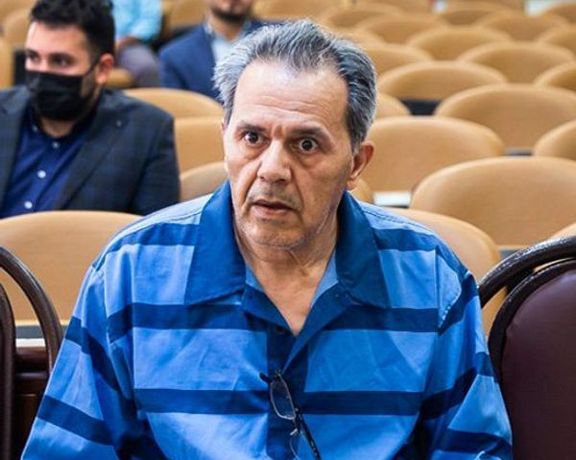
Iran’s judiciary has called a death sentence given to Iranian-German prisoner Jamshid Sharmahd, "just" because he "clearly confessed" to his crimes.

Iran’s judiciary has called a death sentence given to Iranian-German prisoner Jamshid Sharmahd, "just" because he "clearly confessed" to his crimes.
Masoud Setayeshi, the Judiciary Spokesman, said the sentence was “fair”, alleging he was "one of the most [dangerous] terrorists and anti-human elements whose hands are stained with the blood of dozens of people". He is one of dozens of dual nationals held hostage in Iran, subjected to unfair trial and paraded on the world stage.
Sharmahd was kidnapped by agents of the Islamic Republic during a trip to Dubai in the United Arab Emirates in August 2019.
He is accused by Tehran of heading a pro-monarchist group blamed by the government for a deadly 2008 bombing and of planning other attacks in the country.
Following last week's announcement of the death sentence, Berlin has since declared two diplomats at the Iranian embassy 'personae non gratae' and ordered them to leave the country. Nasser Kanaani, the Spokesman of Iran’s Ministry of Foreign Affairs, Wednesday announced that Tehran has also expelled two German diplomats.
Kanaani claimed that the German ambassador in Tehran has been summoned to reassure him that "the Islamic Republic will act decisively” on the matter. He also threatened that if Western powers "ignore the fundamental standards and Iran’s national sovereignty", the Islamic Republic will use "alternative options".
According to the secretary of Iran's High Council for Human Rights, the death sentence issued to Sharmahd "could be appealed".
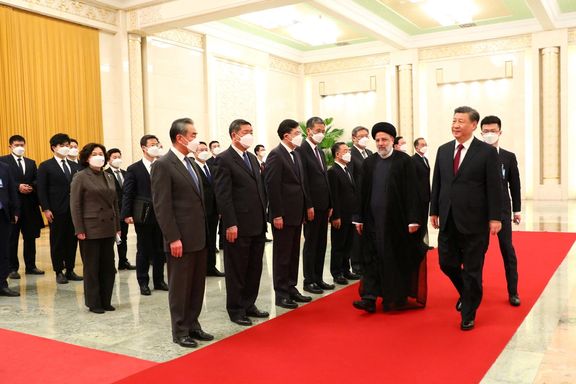
As Iran moves closer to Russia and China, leading Iranian lawmakers and pundits have warned the government against over-reliance on Moscow and Beijing.
Speaking to Shafaqna, conservative lawmaker Mostafa Hosseini Ghotbabadi said that while Iran publicly claims to have a “neither East nor West” approach to foreign policy, it is going too far towards relying on the East at the expense of total alienation from the West.
He said Russia’s war against Ukraine and conflicts between China and Taiwan are calculated games engineered by the world’s biggest powers over securing their share of the world’s resources, luring Iran and its neighbors into the game and distracting Iran from its priorities.
He claimed that big powers use Iran to scare the Persian Gulf states and sell weapons to them and plunder their resources.
Iran, ruled by Ali Khamenei, a staunch anti-West cleric has drawn closer to Russia in recent months, supplying drones and possibly other weapons for Moscow's war against Ukraine. It has also been trying to expand economic ties with China, but Beijing has been cautious in the light of American economic sanctions on Iran.
Foreign policy expert, Diako Hosseini, writing in reformist daily Shargh, said “Iran should not fall victim to the rivalry between China and the United States”, the world in “a transitional period marked by instability … [which is] shaping a new international order”. The revival of Russia after the collapse of Communism and China’s economic success, he says, has jeopardized the United States’ vision to become a singular world power.
“The United States is not merely concerned about China’s growth, it is also worried about China’s expanding ties with the world,” he said, including its ties with Iran, which has a key strategic location between East and West.
Putting restrictions on Iran also helps curb China's rise, Hosseini believes, the United States doing its best to prevent Iran from becoming part of the Russia-China axis. He said: “America’s current plan is to weaken Iran from within and isolate it in the international community. This can be part of a plan to once again create a unipolar world order.”
The new alliance of China and Iran could ultimately backfire, he warned, as it has for Russia. In the long run, Iran will not get concessions from America while its relations warm up with China and Russia and Iran must keep the doors of diplomacy with the West open.
Recently, prominent reformist figure Mostafa Hashemi-Taba, also writing in Shargh about Raisi’s visit to China, claimed that Iran is not capable of implementing an economic cooperation agreement with China as it does not have the administrative structure and manpower.
He also pointed out that the joint statement by China and Iran which was issued at the end of Raisi’s visit is indicative of Iran’s de facto recognition of Israel as for the first time in an official document Iran has used the word Israel rather than its usual jargon “the Zionist regime”.
Hashemi-Taba also pointed out that Iran’s dependency on China has the sole aim of attracting Chinese investment, given the dire economic crisis resulting from sanctions and the impasse on the JCPOA.
Meanwhile, In the United States, the Biden administration and European powers have also expressed deep concern over Iran’s growing military ties with Russia. They have said that a resumption of nuclear talks with Tehran is contingent on its change of policy in supplying weapons to Moscow.

Germany is watching Iran's increasing military build-up with concern, because of its destabilizing activities in the region and drone deliveries to Russia, the Foreign Ministry said Wednesday.
The ministry also cited uranium enrichment in Fordow and the brutal repression of Iran's own population as other reasons for concern and said Germany was in close dialogue with partners in the region and within Europe as well as the United States on these developments.
Iran is increasing its stockpile of uranium enriched to 60 percent and in February news emerged that UN inspectors had found particles enriched to 84 percent.
Tehran has also delivered hundreds of kamikaze drones to Moscow to target Ukrainian infrastructure. The United States and European powers have warned the Islamic Republic to cease its intervention in Ukrainian war, as they have frozen nuclear talks with Tehran.
Iran designated two German diplomats as personae non gratae and is expelling them, foreign ministry spokesperson Nasser Kanaani said on Wednesday.
"The two German diplomats are being expelled due to their country's irresponsible interference in Iran's internal and judicial affairs," Kanaani said.
The US and its European allies have harshly criticized Tehran’s deadly crackdown on antigovernment protesters that killed 500 civilians and sent tens of thousands to jail.
The German foreign ministry said the expulsion was expected but "is arbitrary and unjustified.”
"They have done nothing wrong," the ministry added.
The move came after Germany expelled two employees of the Iranian embassy in Berlin last week in response to Iran sentencing a German national to death.
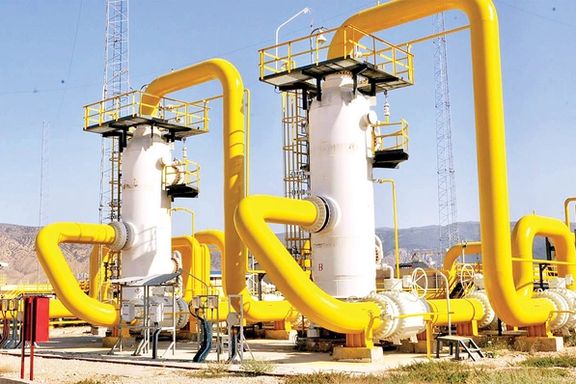
A delegation from Pakistan is due in Tehran soon for crisis talks to avert a possible $18 billion fine to Pakistan for its part in delaying the transfer of Iranian gas.
Officials from the ministries of energy, finance and foreign affairs will meet with diplomats in Tehran to discuss the crisis.
Local Iranian media reported that Tehran has told Islamabad that it must complete its share of a pipeline to receive gas from the Islamic Republic by the spring of next year, otherwise it will face a penalty of $18 billion.
The Iranian portion of the pipeline up to the border with Pakistan in eastern Iran is complete and was part of a 25-year deal to export Iran's natural gas signed between the two countries in 2009.
The project was supposed to be implemented by 2015, but international and US sanctions against Iran and Washington’s pressure on Islamabad have prevented its implementation so far.
The two sides inked a revised deal in September 2019, when Iran agreed not to take the matter to the international courts if Pakistan completed the pipeline by 2024. As the deadline draws near and Iran's economy continues to depend on non-sanctioning countries such as Pakistan, fears for the fruits of the deal are growing.
It is not clear why Iran is insisting on the completion of the pipeline while it has a natural gas shortage at home. Iranian production has been falling because of lack of investments in technology to increase
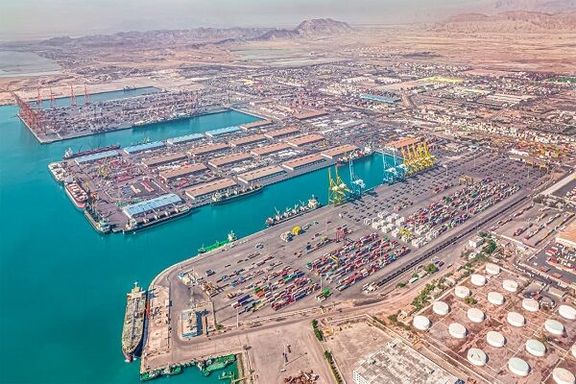
Iran International has obtained a letter from the intelligence ministry about eight ships carrying essential food that cannot be unloaded due to lack of foreign currency.
The secret letter, signed by chief of staff of the vice president’s office Mohammad-Reza Mohammadkhani, contains an intelligence ministry’s bulletin about the content of cargo onboard eight ships stranded at a port in Bandar Abbas, on the Persian Gulf. The letter was written on February 21 and a copy of it was sent to the Governor's office in the province.
In the letter, Mohammadkhani said that First Vice-President Mohammad Mokhber has already ordered the relevant authorities to immediately follow up and share the outcome with the intelligence ministry.
Iran’s government apparently suffers from a lack of foreign hard currencies essential to pay for imports. The Iranian rial has fallen 100 percent since September when nuclear talks with the West failed followed by antigovernment protests.
According to the document, the ships, which arrived in the Iranian waters from October to December, were ready to unload but the Central Bank of Iran has not provided the needed foreign currency to release them. Seven of the vessels carry shipments of wheat weighing about 435,000 tons, the other one is loaded with about 42,000 tons of soybean oil.
In the bulletin, the intelligence ministry also provided details about the names and amount of cargo of each ship as well as the exact date of their arrival at the harbor, but it did not mention how much currency is needed to unload the ships.
In another letter that was obtained by Iran International, Mohammad Kazemi, the deputy commander -in-chief of the IRGC’s intelligence organization had warned Mokhber of the perils of ships piling up at the ports. He expressed concerns that a lack of food security in society may lead to further protests.
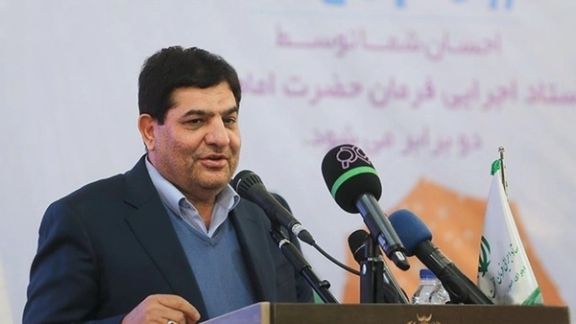
Moreover, another letter revealed a briefing by the secretary of Supreme National Security Council (SNSC) Ali Shamkhani about a meeting with food importers and other officials of the agriculture ministry. Warning the government of looming food shortages and higher prices, Shamkhani expressed concern about prices of animal feed, particularly warning that prices for maize, barley and soybean meal will rise and will affect the production of poultry, eggs, red meat, milk and dairy products. He said the prices of soybean meal will probably double in the next few weeks, leading to a jump in the cost of meat.
Earlier in the month, Iran’s Customs Administration said that at least eight million tons of essential goods have been piling up on ships anchored off the country's southern ports mainly due to payment issues. The deputy head of Customs said that the goods, a large part of which are food and animal feed, cannot be unloaded also due to lack of permits necessary for them to be cleared. Some of the essential goods need three or four permits from the Ministry of Health, Standards Agency and Plant Protection Agency, which oversees the quarantine processes. He said that about 1,800 to 2,000 trucks are being loaded every day and transferred from Imam Khomeini port, but the number of the trucks does not seem to be enough to avoid the blockage.
In January, Iran’s judiciary chief Gholam Hossein Mohseni Ejei said tens of ships have arrived in territorial waters of the country, but the Islamic Republic cannot unload them therefore the country must pay fines for the delay in discharging cargos.
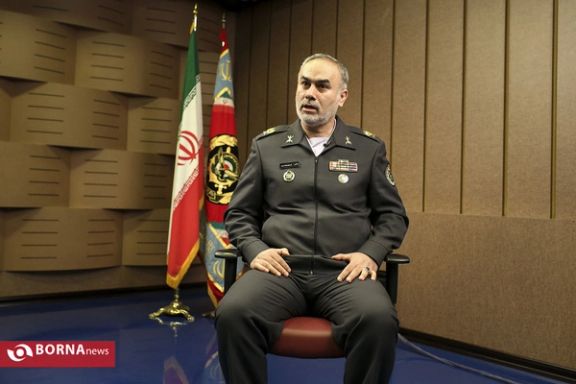
Iranian media say a "defensive" joint exercise by the Revolutionary Guard and the Islamic Republic Army will be held to counter "enemy aerial threats".
Brigadier General Abbas Farajpour, the spokesman for the "joint air defense exercise", said on Tuesday that the drills will be conducted in "two-thirds of the country's skies".
This comes after the National Security Committee of Iranian Parliament recently held a meeting with the officials of the ministry of intelligence regarding "recent events in Esfahan and Karaj".
Residents near Karaj, west of Tehran, published videos of explosions and anti- aircraft fire Thursday night, which the government media described as military drills by the IRGC.
One of these videos showed anti-aircraft tracer rounds soaring into the sky while an explosion can also be seen on the ground. There was no prior public notification of planned military exercises.
Some residents reported on social media that first a series of explosions were heard and then anti-aircraft guns began firing into the air.
Iran has been the scene of several suspected air attacks and sabotage operations since July 2020, largely ascribed to Israel. Any sound of aircraft or explosions usually jolts the population and leads to speculations of another attack taking place.
Serious acts of sabotage targeted Iran’s nuclear installations in 2020 and 2021 and several unexplained explosions occurred at military and naval bases.
The latest incident occurred on January 28 around midnight when a military manufacturing center in the city of Esfahan was attacked by drones.